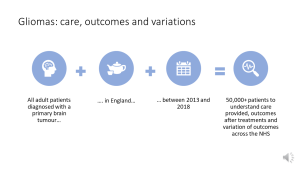After a LOT of waiting, our first proper GlioCova paper is OUT – publicly available here
It reports the incidence, treatment and outcomes for all adult GBM patients in England over a 6 year period. There is lots of detail in the paper, which people can explore at their leisure, but my main highlights are:
- Incidence is static. Actual numbers of patients are rising, because the population is larger and older, but the nuber/ 100 000 of population is the same.
- Most patients (>75%) have a tissue diagnosis of a tumour, and most patients have some treatment
- For patients having aggressive treatment (broadly similar to the “Stupp” regimen) average overall survival is 16 months (i.e. in line with published literature)…..
- BUT less than 1/3rd of patients get aggressive treatment, and so…
- Average survival in the whole cohort is 7 months
- Patients who have surgery or biopsy alone have a very poor prognosis – basically the same as those who have no treatment
One of the things we do in the paper is define four main treatment groups (Aggressive, Intermediate, Biopsy/Surgery only, No treatment) and show that they have very different survival rates, with the last two groups being comparable. Aggressive is chemo-radiotherapy; Intermediate is some form of Radiotherapy or Chemotherapy).
My big takeaway is that if we want to improve outcomes for GBM patients, we need to think about all four groups of patients. At the moment, most research is done in the “aggressive” group. While this is understandable, it ignores the needs of the 70% of patients who don’t receive aggressive treatment.
Finally, thanks to all those involved – especially the lead analyst (and lead authour) Kerlann le Calvez, and Lillie Pakzad-Shahabi for the PPIE work – but also our whole Expert Advisory Group. Such work is not possible without the input and contributions of a lot of people, and this work has been shaped by many people over many years – particularly Helen Bulbeck from brainsTrust, who held a workshop in Leeds in 2016 which started me thinking about a lot of these issues, and conversations with Kathy Oliver from IBTA – and several of the students we have had over the years in the Computational Oncology Group at Imperial.
